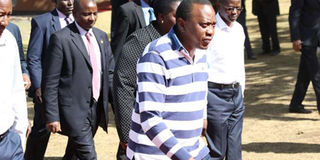Press conferences will not fight corruption; act

President Uhuru Kenyatta at the opening of the induction course for County Commissioners and County Police Commanders at Kenya School of Adventure and Leadership in Kisima, Buuri Constituency, on September 17, 2015. A few months ago President Uhuru Kenyatta announced to Kenyans a new resolve to fight corruption. PHOTO | PHOEBE OKALL | NATION MEDIA GROUP
What you need to know:
- Meanwhile, the investigating authorities have been busy exonerating each of the “step-asided” senior officials, one after the other.
- While the opposition stridently demands that she does the peculiarly Kenyan thing and “steps aside”, she is expectantly looking to Kenyans for praise as a whistleblower.
- It is even worse, in my view, to call a press conference and inform ordinary citizens about these issues without any concrete action being taken against those implicated.
A few months ago President Uhuru Kenyatta announced to Kenyans a new resolve to fight corruption.
As a first step, he produced a list purportedly prepared by a then dysfunctional Ethics and Anti-Corruption Commission and asked all those named in that list to “step aside”. Several ministers led the way, and their offices are still vacant.
Of course “step-asiding” is a peculiarly Kenyan phenomenon whereby a person implicated in corrupt dealings is asked not to show up in office for an indeterminate period of time.
During this time away from the office, this person continues enjoying all the perks of office, including full pay.
Meanwhile, the investigating authorities have been busy exonerating each of the “step-asided” senior officials, one after the other.
CORRUPT DEALINGS
Even as this circus continued, another minister was implicated in corrupt dealings at the National Youth Service.
As the accusations and counter-accusations swirled, the minister seemed to have conducted her own pre-emptive investigations with the help of the Directorate of Criminal Investigations, and arrived at the conclusion that several officials in the ministry are culpable and ought to be prosecuted.
While the opposition stridently demands that she does the peculiarly Kenyan thing and “steps aside”, she is expectantly looking to Kenyans for praise as a whistleblower.
One is constrained to redefine the meaning of the word “whistleblower”.
The ordinary meaning of the word would be an (usually junior) official who exposes corrupt or untoward dealings by powerful individuals in an organisation.
WISTLEBLOWING
If the minister in charge of the powerful docket of Devolution considers herself a whistleblower, it means that there are persons more powerful than her in the ministry who are orchestrating these deals.
By extension, it might mean that the rot goes higher up, and she is powerless to deal with it because doing so would step on toes far more sensitive than her own.
Similarly, in releasing the list of corrupt officials earlier this year the President himself was engaging in an act of whistleblowing.
He was telling Kenyans that there were people suspected of corruption in his government, and that they were so powerful that he could not do much about them beyond reporting their nefarious activities to Parliament.
MORAL PROBITY
Everybody knows that our National Assembly cannot be accused of any amount of moral probity.
A whole retinue of Speakers of the August House can testify to the wheeler-dealing that takes place there.
It is common knowledge that while a minority of our representatives might be making honest efforts to develop legislation for our benefit, the vast majority are firmly focused on the sizes of their abdomens, bigger being better in this case.
Obviously then it is pointless to report to this House any corrupt activity and expect expeditious and honest action against those concerned.
THE ULTIMATE AUTHORITY
It is even worse, in my view, to call a press conference and inform ordinary citizens about these issues without any concrete action being taken against those implicated.
One would argue that a minister has the unfettered authority to fire corrupt public servants in her docket.
Further, because the President is the ultimate authority, his continued perceived toleration of these misconceived shenanigans speaks volumes about his commitment to eliminate corruption.
Prof Atwoli is associate professor of psychiatry and dean, Moi University’s school of medicine; [email protected]





